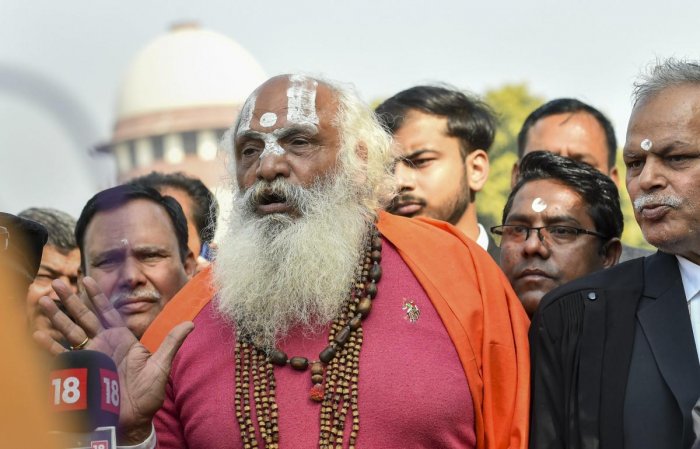
Meet the litigants of the Ayodhya land dispute case

With the Supreme Court expected to deliver its verdict on the disputed 2.77 acres of land in Ayodhya title suit soon, here are the main litigants in the title suit:
Hindu side:
Nirmohi Akhara
The Nirmohi Akhara is a sect of sadhus belonging to the Ramanandi Bairagi sect. The Akhara had moved the Faizabad civil court in December 1959 claiming the ownership of the Babri Masjid structure.
Ram Lalla Virajman
Ram Lalla Virajman is represented by amicus curiae, Trilok Nath Pandey, a member of the Vishwa Hindu Parishad (VHP).
All India Hindu Mahasabha
The Hindu Mahasabha moved the Supreme Court in December 2010 to challenge the Allahabad High Court’s September order. It sought the verdict’s partial annulment and endorsement of the minority judgment that ruled in favour of handing over the entire land to Hindu parties.
Ram Janmabhoomi Nyas
Backed by the VHP, the Nyas is the apex body of saints which has been spearheading the Ram Mandir movement since 1990s. It is a trust formed by VHP in January 1993 soon after the Babri Masjid’s demolition in December 1992, to promote and oversee the construction of the Ram temple.
Also read: Supreme Court to deliver verdict in Ayodhya case today
Muslim side:
Uttar Pradesh Sunni Central Waqf Board
The Sunni Waqf Board is leading the Muslim side in the top court.
Mohd Iqbal Ansari
Iqbal Ansari is an independent litigant and the son of one of the oldest litigants in the case Mohammad Hashim Ansari. Hashim Ansari, a local tailor who lived a few metres from the Babri Masjid in Ayodhya, was one of the first complainants in the case. Hashim died in 2016 and Iqbal Ansari has taken over as petitioner in the Supreme Court.
M Siddiq
Siddiq was the general secretary of the Jamiat-ul Ulema-i Hind, Uttar Pradesh. The petition filed by him on behalf of the Jamiat became the title suit in the Ayodhya case. The Jamiat’s maulana Ashhad Rashidi became the petitioner after Siddiq died.
Central Shia Waqf Board
A trial court had ruled in 1946 that the Babri Masjid was a Sunni property. The Board claimed that it was Mughal emperor Babur’s Shia commander Mir Baqi, who had built the mosque and not Babar, who was a Sunni.
The Shia Waqf Board, also a party in the Allahabad High Court, moved the Supreme Court in 2017 for ownership challenging the 1946 decree in a Special Leave Petition

